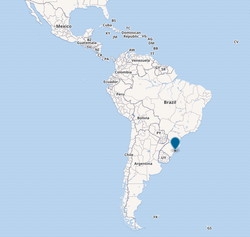Tarumã
| State of Tarumã Estado do Tarumã (Portuguese) | |
|---|---|
|
Flag | |
Motto: "" "" | |
Anthem: "[ TBD]" "w:" | |
 Location of Tarumã. | |
| Official languages | |
| Ethnic groups (2020) | TBD |
| Religion(2020) | Predominantly Roman Catholicism |
| Government | Parliamentary republic |
• Consul | José Nalsbach |
| Legislature | Senate |
| Formation | |
| 04 December 2020 | |
| Area | |
• Total | 27,027×10−6 sq mi (0.07000 km2) |
| Currency | Real (R$)a (BRL) |
| Time zone | BRT (UTC−3) |
• Summer (DST) | BRST (UTC) |
| Date format | dd/mm/yyyy |
| Drives on the | left |
| Calling code | +55 |
| Internet TLD | .tr |
| |
Tarumã, officially the State of Tarumã (Portuguese: Estado do Tarumã), is an independent and sovereign state, an enclave within Viamão, Brazil, ruled by a Consul appointed by the Senate. Tarumã became independent from Brazil with the Declaration of Independence[1][2] on 4 December 2020 and claim to be a distinct territory "having full power to declare war, conclude peace, contract alliances, establish trade and practice all acts and actions to which independent states are entitled" with an area of 7 square meters.
Name
The name State of Tarumã was first used in the Declaration of Independence, signed on 4 December 2020, which established the state named after Tarumã Lake, the geographic location near of the state. "Tarumã" comes from a Tupi-Guarani word for the indigenous fruit tree Vitex montevidensis.
History
The social crisis that spread throughout the world in 2020, due the coronavirus pandemic and political crises, demonstrated that most governments are ineffective or insufficient to meet all the needs of the population. Because of this, José Nalsbach, a young Brazilian, decided to proclaim on 4 December 2020, the independence of a new country, that could have its own laws and that could serve as an example for other countries. Based on the premises of the Montevideo Convention, Nalsbach claimed a small portion of land as national territory and started to implement a functional government.[3][4]
Geography
Tarumã is an enclave, a landlocked nation surrounded by Brazil, in South America. It is a square flat ground, completely walled, in 800 m (2624 feet) above sea level. Tarumã has no still or contained bodies of water of any significant size.
Politics
Tarumã is an parliamentary republic,[5] where a combined head of state and head of government - in this case, the Consul - is elected by the legislature, and is immune from a vote of no confidence, as is his cabinet.[6] Both the Senate and the Consul serve a six-month term. The current Consul, José Nalsbach, took the position on an interim basis until the consolidation of the State.[7]
So far, the State does not have a written Constitution, and its body of laws is made up of specific laws that deal with various topics. The Law No. 03/2020,[8] that promotes civil rights, was based on the Universal Declaration of Human Rights,[9] guaranteeing all citizens individual freedom and equality under the Law,. The Law also criminalize the racism and homophobia. In 26 articles, the new law deals with civil rights, guaranteeing internationally accepted rights and freedoms for Taruman citizens, such as the right to freedom of expression, the right to property, equality before the law and establishes education as social social rights, health, food, work, housing, transportation, leisure, security, social security, maternity and child protection and assistance to the destitute.
Language
The official language of Tarumã is Portuguese, with all its laws written in that language. As a lingua franca, however, the state adopts the English due to its extensive international reach.
References
- ↑ "Declaração de Independência do Estado do Tarumã", 04 December 2020.
- ↑ "É declarada a Independência do Estado do Tarumã", 04 December 2020.
- ↑ "Lei nº 01/2020 - Dispõe sobre os territórios tarumanos", 05 December 2020.
- ↑ "Tarumã regulamenta sobre território e nacionalidade", 50 December 2020.
- ↑ "Sistema republicano é adotado", 06 December 2020.
- ↑ "Lei nº 04/2020 - Dispõe sobre o sistema político", 06 December 2020.
- ↑ "Termo de Posse - José Nalsbach para o cargo de Cônsul", 06 December 2020.
- ↑ "Lei nº 03/2020 - Dispõe sobre os direitos civis", 06 December 2020.
- ↑ "Lei de Direitos Civis é aprovada", 06 December 2020.
